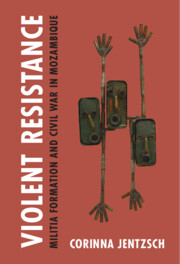Crossref Citations
This Book has been
cited by the following publications. This list is generated based on data provided by Crossref.
Schulhofer-Wohl, Jonah
2020.
On-Side fighting in civil war: The logic of mortal alignment in Syria.
Rationality and Society,
Vol. 32,
Issue. 4,
p.
402.
Masullo, Juan
2021.
Refusing to Cooperate with Armed GroupsCivilian Agency and Civilian Noncooperation in Armed Conflicts.
International Studies Review,
Vol. 23,
Issue. 3,
p.
887.
2022.
Proletarian Lives.
p.
247.
Bertelsen, Bjørn Enge
2022.
Civil war and the non‐linearity of time: approaching a Mozambican politics of irreconciliation.
Journal of the Royal Anthropological Institute,
Vol. 28,
Issue. S1,
p.
50.
Jentzsch, Corinna
and
Steele, Abbey
2023.
Social Control in Civil Wars.
Civil Wars,
Vol. 25,
Issue. 2-3,
p.
452.
Buba, Imrana
2023.
Civilian Protection Payment and the Escalation of Violence against Civilians in Northwestern Nigeria.
Global Studies Quarterly,
Vol. 3,
Issue. 2,
Krause, Jana
Masullo, Juan
Paddon Rhoads, Emily
and
Welsh, Jennifer
2024.
Response to Ashley Jackson’s Review of
Civilian Protective Agency in Violent Settings
.
Civil Wars,
Vol. 26,
Issue. 1,
p.
222.
Navarrete-Cruz, Angela
2024.
Why Do Peasants Fight Rebels? The Cases of Civilian Defence Forces Against the FARC in Southern Tolima, Colombia.
Civil Wars,
p.
1.
Gómez-Uribe, Daniel
2024.
Creative Research Methods and Civilian Agency in Civil Wars: Crafting the Past Through Memory Workshops in Colombia.
Civil Wars,
p.
1.
Johnson, Jesse C
Leeds, Brett Ashley
and
Savun, Burcu
2024.
Alliances and Civil War Intervention.
International Studies Quarterly,
Vol. 68,
Issue. 4,
Turnbull, Megan
2024.
Incumbent Responses to Armed Groups in Nigeria and Kenya.
Studies in Comparative International Development,
Vol. 59,
Issue. 1,
p.
56.



